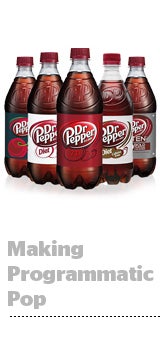Until late 2016, Dr. Pepper Snapple Group had partnered with an agency to manage most of its programmatic and data capabilities. But like many marketers, the beverage brand sees value in making media its own remit.
“It made more sense to pull that in-house so we’d have more transparency into how everything was working, what the costs were behind it and ultimately have more control over what happened on a daily basis through the partners we work with,” said Brit Sundberg, the manager for programmatic media and data strategy for Dr. Pepper Snapple Group.
For now, Sundberg is a one-man band, so Dr. Pepper still relies on its tech partners, such as Adobe/TubeMogul’s managed services team, as it takes greater ownership of its programmatic stack.
Sundberg spoke with AdExchanger about the brand’s journey to build an in-house programmatic operation.
AdExchanger: Why bring programmatic in-house?
BRIT SUNDBERG: There’s a [domino effect] propagating throughout the industry around questions like, “Who do you partner with?” and “What’s their approach to A, B and C?”
We realized it was something we needed to own more directly. We’ll always have our own best interests in mind more than anyone else. That’s not to say we don’t have great partners, but at the end of the day, we wanted to be able to speak more intelligently about our plans, rather than deflecting to someone else.
I’m assuming you formerly had a trading desk managing your TubeMogul DSP deployment.
Our trading desk was placing media through Tube and a variety of other DSP partners, so my level of interaction wasn’t direct originally. It was all going through the agency at that point.
When we made the decision to bring this all in-house, that’s when we started to have more robust conversations around going direct. Going into this year, we’ll be looking to partner more heavily with TubeMogul/Adobe on media execution.
What other products do you use? Do you have a data management platform?
We partner with Oracle’s BlueKai product. It’s one of those things where the space is constantly evolving and what we may do tomorrow may be vastly different from today. I’m always looking for partners who are doing things more efficiently and cost is always a factor, of course. We’re constantly evaluating new partners.
What new capabilities do you want?
We really want to expand our capabilities in analytics and insights. The CPG space offers its own set of challenges. We know where consumers are consuming media, but would like to be more forward thinking with where we’re targeting them and why we’re targeting them.
How are you leveraging offline data in your media mix?
We rely heavily on third-party consumption data, so within our relationship with Oracle Data Cloud and Datalogix data, we do significant targeting based on past purchases. Depending on brand goals, we might want to reach people who are pretty heavily buying the brand and that would be a top-of-mind awareness play. But, if we just launched new brand, we may go more after conquesting and competitive targeting.
How do you weigh your investment in traditional vs. digital in your media mix?
It really depends on the brand. Dr. Pepper is one of our largest brands, so they get a disproportionate amount of our spend within overall marketing. But we have about 10 brands – including Snapple, Canada Dry and 7Up – that we actively put media behind.
How much of our overall revenue each brand pushes determines how much we activate against it. We always let consumption behavior drive where we serve media, so if we have a brand we know for sure reaches a lot of younger people or those cutting the cord, we’ll evaluate what we put into linear TV vs. OTT or streaming audio. We let who we’re targeting determine the media mix.
What do you want to improve with measurement?
We don’t have a complete feedback loop where if someone served an impression, we’d know exactly how they’re moving down that funnel. We have a budding ecommerce capability we’re building right now, but all of our distribution channels add a certain level of complexity. This isn’t about flipping a switch on with Amazon.
We’re going to start testing, things like, “Is there observable lift on a call to action from a generic learn more versus a buy-now product creative?” It’s an objective we have for this year.
Interview edited for clarity and length.













